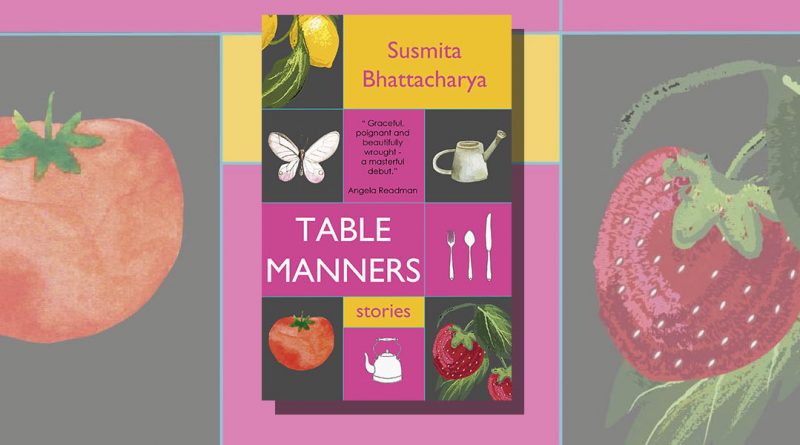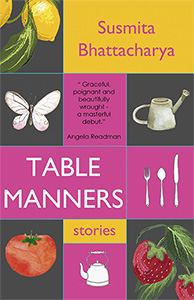Table Manners by Susmita Bhattacharya
–Reviewed by Dipika Mummery–
Winner of the 2019 Saboteur Award for best short story collection, Table Manners (Dahlia Press) by Mumbai-born Susmita Bhattacharya is an eclectic set of simply told and occasionally devastating stories largely focusing on the interior lives of Asian women both in the UK and abroad.
Bhattacharya’s neat, clear prose outlines the stories of characters battling the ups and downs of romantic and familial relationships, as well as immigration, poverty and loneliness. As the collection’s title suggests, many of the stories feature food in some way, from homegrown tomatoes and simple chicken and rice to gelato and juicy mangoes.
In the title story, it is food that brings together a widowed man and an elderly Chinese woman, after he watches her family enjoy meals together from across the street:
“The Chinese family across the street is cooking. The whole street knows. Into this cold grey evening they infuse the smell of garlic and lemongrass. The steam from their bubbling pots condenses on their window, creating a soft blur of their movements.”
The narrator is invited into their house, where he eats his “first home cooked meal in a very long time”, and the woman shows him pictures of her family, prompting him to recall his own and draw comfort from memories – a recurring theme throughout the collection.
Food provides more solace, but of a twisted kind, in ‘Comfort Food’, in which a woman is called away from the favourite meal she is cooking to eat out at a restaurant with her husband and a client that he needs to impress. She manages to get to her meal once she returns home, although she makes room for it in a startling but matter-of-fact way, with Bhattacharya’s quiet prose at odds with the violence that she describes.
Elsewhere, food holds more significance as a symbol of hopes and dreams. In ‘Growing Tomatoes’, Hoda is a second wife to a man who needs an heir that his first wife cannot supply. She has to travel far from home to England to take up this role, and after observing a fertile neighbour growing tomatoes in her garden, decides to do the same, her plants bearing fruit after her husband finally agrees to a test to see if the infertility problem lies with him and not his wives:
“And one day, they were there, her tomatoes. Glittering red balls of sweet, sweet promise. She fussed over them, loving and proud.”
Yet Table Manners isn’t all food and heart-warming endings. Other stories in the collection look at the impact of real-world political events on the lives of their characters. In ‘Letters Home’, we read correspondence from Hassan, a Bangladeshi man living in Cardiff, to his wife back home.
All seems to be going well until a letter dated July 2005, in the aftermath of the 7/7 terrorist attacks in London, which seems to upend the progress he has been making so far. Hassan’s voice is wonderful in this story – both hopeful and doubtful at the same time, and shot through with unintended humour due to his wide-eyed innocence.
“Muyazzumbhai’s daughter having baby also. She has photo of baby inside stomach. I cannot believe it. Then he showed me, and I think, this like E.T., that bhoot. He get very angry.”
Nodding to more recent political events, the dreaded B-word crops up in ‘Marked’, which starts off at the Taj Mahal as a golden love story, but the realities of life set in, and the couple we see at the start – Hindu Anuradha and Muslim Irfan – end up in very different places years later.
As the results of the UK’s referendum on EU membership are announced, Anuradha is at the Taj Mahal again with her husband, while Irfan is in the UK dealing with graffiti on his car:
“Someone had singled him out and told him to go home. This was the repercussion that was inevitable. They didn’t mean it personally. It was a baggage he would have to carry all his life.”
Overall, Table Manners is a beautifully written set of stories filled with joy, sorrow and lots of other emotions in between, many of which reward multiple readings. It takes much talent to write the simplest of stories in a way that will deeply affect the reader, but Bhattarcharya does just that – while also making you very hungry indeed.
Find out more about Table Manners on the Dahlia Press website.

Reviewed by Dipika Mummery — Dipika is a short story writer from Manchester who is gearing up to have a go at a novel. Her day job is in digital content, and she is a voracious reader, frequent gamer, occasional baker and barely competent runner.
Twitter: @DipikaMummery | Website: dipikawrites.wordpress.com






